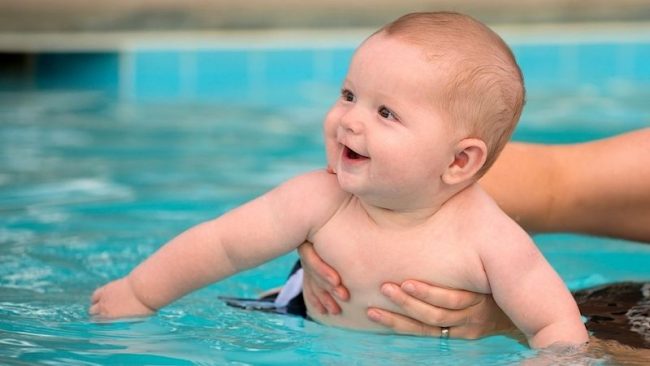
The prospect of teaching an infant to swim strikes many people as insane the first time they hear about the practice. While it’s important to take the necessary safety precautions, it’s definitely possible to teach your infant to swim. Infants are in a unique position to learn how to swim since they have the natural responses built-in at an early age. Even before a baby begins to walk, swimming is possible since swimming doesn’t require the same strength as standing.
Build Greater Water Enjoyment
According to Parenting Magazine, helping your infant learn to swim makes them more comfortable in the water. This results in your child having more fun, and it may even save your child’s life, since water-related accidents are a primary reason for infant death. By teaching your child to swim early, you’ll eliminate much of your child’s fear of water.
Building Trust with Water
While hiring a swimming lessons instructor is a good idea, you can also build trust with your baby by taking daily showers. It’s important to exposure your child to water gently at first. Traumatic experiences with water may make it more difficult to teach your infant to swim, and it could result in a fear of water later on in life. Small and frequent experiences that are rewarding and enjoyable can ensure your child has a healthy approach to water-related activities.
Take Proper Precautions
There are some precautions you can take to make the experience more enjoyable for your child. Make certain the water is warm enough for your child. Cold water can be upsetting, and this becomes especially important if you have a small infant. Try to avoid taking your child to a pool that has too many chemicals.
While you need some chemicals, too many can dry out the skin and cause problems with your infant’s skin, eyes and ability to breathe. This is actually the greatest risk associated with proper swim training for an infant. Babies can be easily taught to swim, but it’s the chemicals in a pool that can cause real harm.
Skills to Hone
When an infant begins to learn to swim, it’s important to start with a familiarity to the water. Once this has been established, you can begin to teach your infant breath control to learn how to breathe while under water. This can take some time, and most infants won’t actually start swimming until they are at least 16 months old.
However, with the proper preparation, the infant can develop the pre-requisite skills necessary to teach your child to swim. Once breath control is mastered, your baby will begin submersion and back floating techniques to help them learn how to swim.
The Best Age to Start
While there are some parents who may begin training when their child is as young as a one-month-old, this is typically not recommended for the best safety. SwimJim, a service that specializes in providing safe swim lessons for children, suggests that infants between 6 to 15 months are at a suitable age for swim lessons. Infants who are younger than this are at greater risk.
Your baby should have some basic motor control before beginning infant swimming lessons. Every child is different, so it’s important to use the services of a professional to ensure you are able to teach your child how to swim safely and effectively.
Provided you take the proper precautions, you can teach your infant to swim safely and effectively. Teaching your child to swim at an early age can make it safer for them and more enjoyable. When your child learns to swim, you’ll set them up with the ability to enjoy a lifelong activity that will help them enjoy a range of watersports.